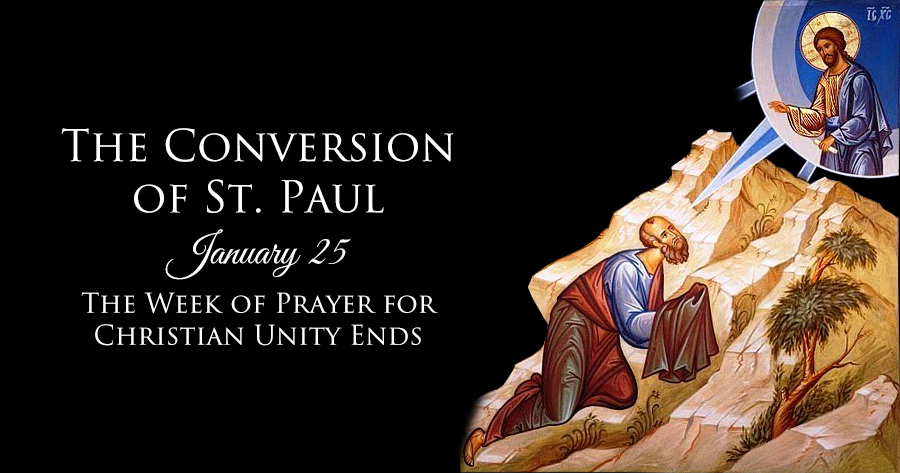
About the Commemoration
The Week of Prayer for Christian Unity Ends
This feast celebrates a momentous event: the sudden, dramatic, and radical change in Saul, the fanatical persecutor of the young church, who became Paul, the “fool for Christ” (2 Cor. 11:16-17), the apostle to the nations. He who had set out to destroy the Church spent his life building and extending it. This great triumph of the risen Christ over a dedicated enemy was of such decisive importance for the young church that the story of his conversion is told three times in Acts (9:1-22; 22:3-21; 26:9-20), and Paul himself makes mention of this experience three times in his letters (Gal. 1:11-16; I Cor. 9:1-12; 15:3-11).
The origin of the observance of the Conversion of St. Paul is obscure. The commemoration seems to have begun in Gaul, as contrasted with the Festival of Saints Peter and Paul, which began in Rome. In the fourth-century martyrology of St. Jerome, the day is called the “translation” of St. Paul, which suggests that the day may have begun as a celebration of the anniversary of the moving of the relics of Paul to his basilica outside Rome. The day does not seem to have been generally observed until about the twelfth century. The festival was especially popular in northern Europe, and this, in addition to its biblical basis, perhaps accounts for the retention of the day on both Lutheran and Anglican calendars. The day was traditionally of lower rank than the feasts of the apostles, however, and in England it was retained on the calendar only with some difficulty.
The day marks the conclusion of the Week of Prayer tor Christian Unity. The feast is not celebrated in the East.
Excerpts from New Book of Festivals & Commemorations: A Proposed Common Calendar of Saints by Philip H. Pfatteicher, copyright, 2008 by Fortress Press, an imprint of Augsburg Fortress.
See also: Conversion of Paul the Apostle; Week of Prayer for Christian Unity
Reading
From The Word of Cod and the Word of Man by Karl Barth
We all know the curiosity that comes over us when from a window we see the people in the street suddenly stop and look up—shade their eyes with their hands and look straight up into the sky toward something which is hidden from us by the roof. Our curiosity is superfluous, for what they see is doubtless an aeroplane. But as to the sudden stopping, looking up, and tense attention characteristic of the people of the Bible, our wonder will not be so lightly dismissed. To me personally it came first with Paul: this man evidently sees and hears something which is above everything, which is absolutely beyond the range of my observation and the measure of my thought. Let me place myself as I will to this coming something that in enigmatical words he insists he sees and hears, I am still taken by the fact that he, Paul, or whoever it was who wrote the Epistle to the Ephesians, for example, is eye and ear in a state which expressions such as inspiration, alarm, or stirring or overwhelming emotion, do not satisfactorily describe. I seem to see within so transparent a piece of literature a personality who is actually thrown out of his course by seeing and hearing what I for my part do not see and hear who is, so to speak, captured, in order to be dragged as a prisoner from land to land for strange, intense, uncertain, and yet mysteriously well-planned service.
And if ever I come to fear lest mine is a case of self-hallucination, one glance at the secular events of those times, one glance at the ’widening circle of ripples in the pool of history, tells me of a certainty that a stone of unusual weight must have been dropped into deep water somewhere tells me that, among all the hundreds of peripatetic preachers and miracle-workers from the Near East who in that day must have done along the same Appian Way into imperial Rome, it was this one Paul, seeing and hearing what he did, who was the cause, if not of all, yet of the most important developments in that city’s future.
Karl Barth, The Word of God and the Word of Man, trans. Douglas Horton (Boston: Pilgrim, 1928), 62-63.
Propers
O God, by the preaching of your apostle Paul you have caused the light of the Gospel to shine throughout the world: Grant, we pray, that we, having his wonderful conversion in remembrance, may show ourselves thankful to you by following his holy teaching; through Jesus Christ our Lord, who lives and reigns with you and the Holy Spirit, one God, now and forever.
Gregorian sacramentary, RS, trans. BCP
Readings: Acts 22:3-16 (RC)/Acts 9:1-22 (LBW, ELW, LSB)/Acts 26:9-21 (BCP); Psalm 117 (RC)/Psalm 67 (BCP, LBW, ELW); Galatians 1:11-24 (BCP, LBW, ELW, LSB); Mark 16:15-18 (RC)/Luke 21:10-19 (LBW, ELW)/Matthew 10:16-22 (BCP)/Matthew 19:27-30 (LSB)
Hymn of the Day: “We sing the glorious conquest before Damascus’ gate” (H82 255) or “O Spirit of the living God” (H82 531, LBW 388)
Prayers: For the unity of the church; For renewal of faith; For preachers of the gospel; For opening our eyes to see beyond this world; Non-mainstream Christian communities; For theologians and councils seeking to promote Christian unity while preserving Christian truth.
Preface: Apostles
Color: White
